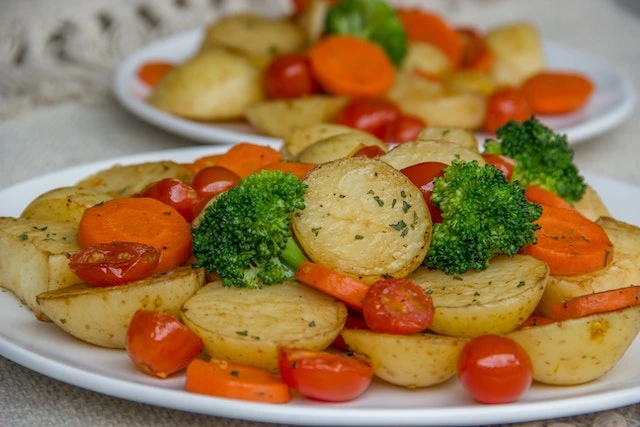Health Benefits of Lemons
The sharp, clean scent of lemons gives a hint of the wealth of positive benefits hidden inside. They contain vitamins C, B6, A, E, folate, thiamin, riboflavin, copper, calcium, iron, magnesium, potassium, zinc, phosphorus, folate, and some protein.
Lemons also contain flavonoids, containing antioxidant and cancer fighting elements. They have a positive effect on high blood pressure, fever, diabetes and upset stomach, among many other benefits. They also can fight kidney stones by forming urinary citrate, thus preventing crystals forming in the kidneys.
Foods to Help Lower Your Blood Pressure
After your blood pressure check, the first thing your doctor might ask you is, "how much salt do you eat?"
Great question, as salt is the easiest culprit in our diets. The problem is that most of us haven't got a clue
what the answer is to that question.
Put Potatoes On Your Plate

![]() Download as PDF
Download as PDF
The lowly potato has gotten a bad rep. Many of us steer clear of potatoes, assuming that they are a fattening starch, or “bad carb”. The truth is, the potato is a powerhouse of good nutrients and dietary antioxidants, which help fight age-related diseases.
Myths and Misconceptions About Fat
What exactly is fat anyway? First, the fat we take in through food is made up of lipids or fatty acids, and it comes in various forms, ranging from liquid oil, such as olive oil, to solid, such as hydrogenated margarine and shortening. However, the fat in our bodies is a type of tissue made up of cells containing stored fat. This fat can be "white fat", which is found in large cell sacs, or vesicles. Stored fat can also be "brown fat", which is made up of lipid droplets. Let’s address some of the myths and misconceptions surrounding fat.
Grocery Inventory with Printable Inventory Sheet
Download an extensive grocery list and print it out. Check your own inventory before going to the store or planning meals.
Here is the printable full article with attached grocery inventory list.![]()
Here is the printable grocery inventory list, for black and white only printers.![]()
Here is the printable grocery inventory list, for colour printers.![]() (Red category headers)
(Red category headers)
First, write down every category of food in your cupboards, refrigerator and freezer. You'll have a list that includes things like meat, fish, dairy, vegetables, (fresh, frozen andcanned) grains and pasta, breads, condiments, etc.
How Much Sodium Do We Need?
Sodium is one of the most common sources of flavour in our food, and is found in virtually everything we eat. Over consumption of sodium is a major factor in our self-inflicted poor health. Health Canada reports that the average Canadian takes in about 3,400 milligrams of sodium each day. However, the government-recommended daily limit now is 2,300 mg, with the current medical and scientific communities recommending a limit of 1,500 mg per day.
The effects of excess sodium on our bodies are wide-ranging.
Crush on the Crunch! Cruciferous Vegetables
![]() Download as PDF
Download as PDF
Cruciferous Veggies
When planning a lunch or dinner, we all tend to choose from a small group of vegetables – the tried and true that we know well. Some of the most popular vegetables in Canada include potatoes, lettuce, onions, and tomatoes (technically a fruit, but used as a veggie!). These are all great foods and each brings good nutrition to your diet, but there is another family of vegetables that will add variety and impressive health benefits to your plate – the cruciferous vegetables.
Carbs- What Should I Be Eating?
There are some “diets” that have gained notoriety in the last several years that suggest we avoid carbohydrates. But carbs-as-evil is a huge misconception. Carbs are the gas in your gas tank! They are essential for boosting energy and improving your mood and emotional state. In fact, carbohydrates are what the body likes to use best as fuel.
The Canada Food Guide suggests that two-thirds of our food should be carbs. But not just any carbs will do the job.
Safe Food Storage
One of the most persistent myths about refrigerated food is that if it smells okay, it's okay to eat it. Wrong.
Lots of food can go bad without even a whiff of decay, and can cause you serious and even life-
threatening food-borne illness. Refrigeration doesn't stop the clock on decay - it only delays it.
So how long can you safely store food in your fridge?
Eating Less Sugar for Better Health
![]() Download as PDF
Download as PDF
We know that eating too much sugar can cause or contribute to a lot of health problems, such as diabetes, obesity, elevated blood pressure, certain types of cancers, stroke, gallbladder and liver disorders, respiratory problems, and more.